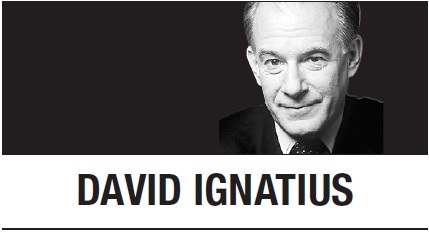[David Ignatius] The Iranian people are showing their deep hunger for change
By David IgnatiusPublished : Jan. 7, 2018 - 17:38
 After visiting Tehran in 2013, I wrote that the Iranian capital seemed suspended somewhere between Pyongyang and Los Angeles. We’ve seen this past week how passionately Iranians want the latter, not the former -- as they denounced their impoverished garrison state and demanded a prosperous, modern future.
After visiting Tehran in 2013, I wrote that the Iranian capital seemed suspended somewhere between Pyongyang and Los Angeles. We’ve seen this past week how passionately Iranians want the latter, not the former -- as they denounced their impoverished garrison state and demanded a prosperous, modern future.Asking whether Iran’s demonstrations create a “pre-revolutionary” situation may miss the larger point. The process of change has already begun. The regime will use its instruments of repression, and the unrest may wane. But the protests have been so widespread, in what a former US intelligence officer says are 80 cities, that it will be impossible to put the whole country back in a box.
The Iranian protests have dramatized the contradictions that have been deepening since the 1979 revolution -- between aged theocratic rulers and a restless young country, between Iran’s immense economic capabilities and its poor performance, and between its foreign adventures and domestic needs. The government is split, with President Hassan Rouhani expressing sympathy with the protesters and Supreme Leader Ali Khamenei hoping to crush dissent.
In today’s world, it’s hard to argue that repression won’t work in the short run. But this is a long game, and while the mullahs have the guns, they seem to have lost the public’s trust. As the regime weakens, there’s space for a popular leader who speaks for an unhappy country. A week ago, that might have been Rouhani, but he seems to have lost his chance.
Western governments are split about how vigorously to support the Iranian protesters. President Trump’s boisterous tweets have offended European governments, which argue they make it easier for the regime to blame the “Great Satan” and other outside meddlers. This week, France, Germany and Britain balked at a US request for a joint statement on Iran. Although Trump’s rhetoric is often recklessly irresponsible, on this question he’s right.
The West certainly should be careful about statements that encourage Iranians to open rebellion. There’s moral hazard in such cheerleading. But silence is wrong. The West should urge Iranian protesters to remain peaceful (they’re more likely to succeed that way) and also warn the regime that it will be held accountable for violence against its citizens. If the government cracks down hard, as it did during the 2009 Green Movement, it must face real consequences.
The West should also help keep communications open with Iran. The regime is restricting messaging, but they’ll have trouble blocking it entirely. Iran has an estimated 48 million smartphones today, compared with 1 million in 2009. Iranians can access more encrypted messaging apps than the regime can block. From some southern points, cellphones can reach networks in the United Arab Emirates and elsewhere. The number of cellphone videos posted from Iran seems to have declined sharply through this week, but a total digital blackout will probably be impossible.
With the world focused on the repressive, destabilizing nature of the Iranian regime, the Trump administration would be idiotic to shift the subject to the Iran nuclear agreement. Trump should leave the pact in place and concentrate on Iranian meddling abroad. With Tehran distracted at home, this is an ideal time to squeeze Iran’s logistical pipeline to its proxy forces in Yemen, Syria and Lebanon. In challenging Iranian proxies, the US and its allies will amplify the protesters’ chant: “Not Gaza, Not Lebanon, I give my life for Iran.”
Iran’s leaders undoubtedly will blame America and its allies, regardless of what Trump and the Europeans say. Ali Shamkhani, secretary of Iran’s supreme national security council, declared in a television interview this week, with spurious precision, that 27 percent to 29 percent of the protest hashtags were generated by the Saudi government. Saudi Arabia is certainly delighted by the protests, but the idea that nationwide demonstrations are the result of a foreign conspiracy is self-deluding, and also logistically impossible.
What’s the lesson of the past week for the Middle East? I put that question to Prince Khalid bin Salman, the Saudi king’s son and ambassador to Washington, and here’s his answer, “The Iranian regime tried to block the future. They’re waging a backwards revolution. We want to go the other way.” If the Saudis really are betting on youth and modernization, they’re going in the right direction.
The Iranian regime was rocked this week, and it will fight back ruthlessly. But it’s hard to imagine the theocracy prevailing indefinitely in a society so hungry for change. The West can’t wage this fight. But it shouldn’t be afraid to say who’s right and wrong.
By David Ignatius
David Ignatius can be reached via Twitter: @IgnatiusPost.
(Washington Post Writers Group)

















![[KH Explains] Hyundai's full hybrid edge to pay off amid slow transition to pure EVs](http://res.heraldm.com/phpwas/restmb_idxmake.php?idx=652&simg=/content/image/2024/04/18/20240418050645_0.jpg&u=20240419100350)

![[Today’s K-pop] Zico drops snippet of collaboration with Jennie](http://res.heraldm.com/phpwas/restmb_idxmake.php?idx=642&simg=/content/image/2024/04/18/20240418050702_0.jpg&u=)